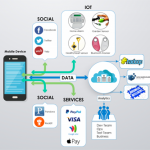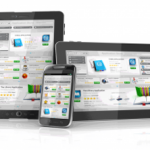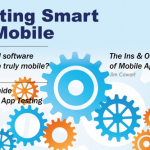The mobile application ecosystem is very dynamic. OEMs are launching new devices and new customization, and new OS versions are delivered every now and then. This is the constant challenge that most enterprises face.
As the new versions of devices and operating systems create capabilities to expand your application, it’s imperative to test your app quickly over an ever expanding variety of devices so your newer versions are as spotless as ever. To achieve this, innovative testing techniques are required to be implemented to ensure optimal performance and user experience regardless of the type of his handset, operating system, geographical location and network service provider.
A cloud-based mobile App testing approach can be a potential solution that can offer enterprises a feasible & viable solution. Cloud-based testing offers Web-based access to a large pool of real handsets and devices connected to live networks spread globally, providing enterprises with end-to-end control for manual and automated testing practices.
By now, most enterprises have used or at least have heard about cloud computing. However, with the advent of Mobile technology and the rapid increase in the number of Mobile users, the need for Mobile Cloud computing is increasing fast. Before adopting this new technology for your own business needs, it is important to understand the benefits of Mobile Cloud computing.
Accessibility | Collaboration | Continuous testing
Distributed teams are more and more common nowadays. Cloud based test management platforms make it possible for teams spread across different locations to easily collaborate with each other. You can log in from anywhere in the world, at any time, on any device, and get access to the project. Testers can easily test from different locations and access test reports from anywhere in the world. A central repository for all of your testing efforts that’s updated in real-time makes it infinitely easier to share important data, communicate with each other, and track all of your testing efforts.
You can test 24 hours a day. A central server connects to a series of machines located anywhere you want. Each one of these host machines can host up to ‘n’ mobile devices. Every device is made available to anyone who connects to the server. A tester in any company office can connect to the cloud and select the device he wants to test his application on. Say the day starts with European testers, moving on to North American team & ends at India QA team. This establishes a 24 hour round the clock mobile testing process that won’t stop until your app is on the market.
This gives numerous companies, especially startups, a competitive edge. For instance, if they have a globally dispersed team located at the opposite ends of the world, they can still collaborate on the most complex projects using cloud-based tools to test their applications. All in all, this speeds up decision-making, and hence helps in speedy delivery of the project.
Benefits of Virtualization
Cloud based tools bring in the benefits of virtualization. They enable companies to make optimal use of their resources with the result that testing is more flexible and efficient. As applications become increasingly complex, virtualization brings in the benefit of resource sharing with reduced capital costs.
Competitive price range
When you compare cloud-based to the regular test automation tools, you will find that the cloud-based ones are available at a competitive price. This is obvious from the fact that you need not spend a considerable amount of money to upgrade the hardware of your device(s). Moreover, the option of ‘pay as you use’ lets you use the tools only when it is necessary, and therefore, saves on the costs later when you are not using them. This works for most companies, especially the ones who are looking to cut down on their expenses.
Ease of access | User-friendly Interface
Cloud-based test automation tools are ready for use the very moment you buy them. Easy access through the Internet allows team members to work from anywhere, anytime. No more installation woes, setup requirements, hunting for servers, or prepping of hardware to start using them. This means that it reduces a lot of effort required from the IT management teams and puts the focus back on the core functionalities of an enterprise.
More often than not, cloud-based automation tools have an incredibly user-friendly interface. This makes them quite easy to use, even for novice developers, as there is hardly any special training required for the software.
Favors Continuous Integration
Continuous Integration – Every time you add a piece of code, test it & then redeploy it. Cloud testing is ideal for continuous integration. The continuous integration platform orders the tests on various devices within the mobile lab. If they all pass, the mobile app can immediately moves to production and release. Cloud testing ensures that you can test under larger scenarios right away. New builds can become new versions faster than ever before, benefiting not only the testing team but also the entire development team as well.
Increase the Test Coverage | Ensure Quality
Nonstop & parallel cloud testing gives you the luxury of expanding the amount of scenarios you can cover in the same time period. Cloud testing environments offer highly synchronized and pre-configured architectures. These pre-built environments radically reduce the defects associated with unstable test configurations. With Cloud-based solutions, test your App across a huge matrix of devices. This improves the quality of tests to a great extent. Being able to maximum the Test coverage in the minimum time becomes critical to the success of the mobile application.
It’s Cost Effective
In most cases, cloud applications have minimal or no upfront cost. It is very much a pay-for-use service which has helped to grow adoption of the model, especially for SMBs. Without hefty fees for licensing and upgrades, the cost of adoption is less of a barrier when cash flow is an issue.
No need to buy duplicate devices even if you have more than one testing team located in different offices. Cloud based automation tools do not involve expensive per seat licensing costs and typically have less hardware requirements. This implies minimal capital expenditure and depreciation costs. No capital expenditure and much faster deployment times means you can have minimal project start-up cost and infrastructure cost. Wear and tear on any device will reduce its useful life, and increase a company’s depreciation and amortization expenses. As long as all of the work is being done remote, the devices sit in a mobile lab untouched.
It’s Time Efficient
Automation tools, in general, offer advantages of high productivity and shorter test cycles. Cloud based automation tools bring the additional advantages of quick set up and tool deployment. With cloud-based testing, there are no additional needs to advanced testing tools, server configurations, licensing, and testing resources. All of these features allow you complete the testing process within the stipulated time frame, or possibly even before that. Unlike traditional tools, they do not involve a lengthy set up and installation process. Testing can begin almost immediately from anywhere in the world. Faster testing reduces the time to market which gives companies a big competitive advantage.
Local Networks | Worldwide reach
Using cloud technologies can enable you to evaluate the applications’ global readiness & conduct tests across the globe by replicating virtual users in a variety of different locations to ensure the app can handle users far and wide. You can test your App over different local networks. Using the cloud lets you connect any device to a host machine in different parts of the World. With all of these devices connected to the server, and available to any tester, your team has access to all of these local network carriers to determine whether or not your application works well anywhere.
Cloud Testing is perfect for the Mobile economy. Cloud Testing is the only method that puts an application through a rigorous process, making it ready for the unexpected surprises that will come in traffic and usage.
Parallel execution
Coupled with the right test automation tool, parallel execution enables you to run the same tests on multiple mobile devices all at the same time. Instead of being limited to the number of USB ports in your computer, you can run a test on 20, 30, 50 different devices all of their own combination of sizes, versions, operating systems, even under different simulated network conditions.
Performance Testing
Using Cloud-based solution, scalable simulation of virtual users is possible at significantly lower cost. Using a cloud based approach to performance testing, the hardware is all in the cloud, using existing infrastructure. With this approach, servers can be spun up to simulate thousands of virtual users in minutes, with the charges based on a pay for what you use model. Businesses can simply schedule time for a test and resources are automatically provisioned. Licenses are now much more flexible for performance testing tools, with the rise of open source tools allowing even greater savings for comparable quality, when combined with a cloud based load provider.
In addition, cloud-based services can provide a diagnosis of any performance related issues when they arise – giving teams the detailed diagnostics they need to pinpoint the nature and location of the problem in order to remediate quickly.
Prioritize your Device usage
Cloud testing increases efficiency by prioritizing devices. A centralized database gives the device manager power to assign and reassign devices to the testers. At any moment one project can become top priority (it can be a popular application where a bug was just found). It can be a minor application that a competitor released and now you have to have your version deployed to the market within hours. Without any fighting, arguing, or exchanging of physical devices the manager can press a few buttons and projects with greater urgency are immediately provided with what they need.
Real-time Results
Real-time visibility of testing is possible for project teams. A cloud-based testing environment provides real-time testing results, which means defects can be analyzed while the tests are running. This allows all members of the project team to collaborate in real time on a test, often including software suppliers – so that problems can be identified and rapidly resolved.
Reliable | Reduced IT management effort
There’s a dedicated team working on the cloud-based test management platform and they’re contractually obliged to keep it up and running. You can expect 24-hour support and you should seek a contract where you’re compensated for any downtime. Reliability should be much higher than with a locally maintained solution that’s serviced by a stretched internal IT department with a lot of other things to attend to.
Cloud based tools cut down a lot of the IT management tasks inherent to traditional tools like installation, licensing, adding/replacing users and simultaneous implementation of upgrades in systems across geographies etc. With less IT management to do, employees can focus on core activities that can make a difference to a company’s business.
Scalable – Up & Down
It’s a simple fact that projects demand different levels of testing at different points in their life cycle. Whether you automate or bring in more testers to shoulder the increasing burden, you want a management tool that’s easy to scale up and down. Cloud-based versions of the tools can be used for functional testing, performance testing, and many other testing types. In short, they can be used as a complete test management tools. With a cloud-base service you can forget about installation, configuration, and maintenance woes. You have a simple browser log-in that’s accessible on any device, and you can add or remove licenses whenever you need to.
Security is not an Issue
Instead of accessing a third party mobile lab and downloading pre-released application code outside of your business, the right cloud testing tool works within your business’ virtual private network (VPN) so all the information about how your mobile app is made never leaves the privacy of your company. Be assured that security concerns are being addressed by the higher-ups in the technology industry, which makes these tools secure for usage.
Support Agile development
Agile development is the concept that cross-functional teams are involved through-out the development process, and not a step by step approach. Cloud testing empowers every member with all of the tools at his fingertips regardless of where he is or what he is working on at the current moment. Cloud-based Mobile App Testing reduces time to market and significantly augment testing competence. Cloud-based test management tools make you more agile and flexible, enabling you to adapt and change direction quickly which is a competitive business advantage.
Perfect for the Mobile Economy
Implementing a cloud-based testing approach with agile testing methodologies for mobile applications is the need of the hour to quickly and cost-effectively respond to rapidly changing markets, with a satisfactory level of service quality and compatibility maintained across the wide variety of available mobile devices.
An increasing number of app developers are migrating from the in-house to cloud-based development environments in order to build their apps more cost efficiently, with the allure of lower maintenance and operational costs. While these are potential benefits for variety of app developers, not all companies can rely on cloud-based environments due to regulatory, security and privacy risks. In fact, all app developers & testers must carefully evaluate their needs before committing to either approach to avoid compliance issues and unforeseen expenses.





















